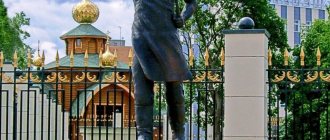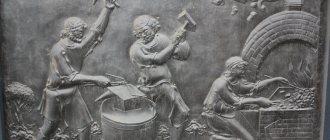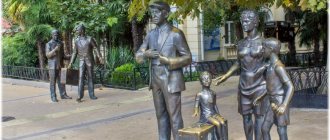“Oh yes Pushkin!” What really happened 185 years ago on the Black River
The biography of Alexander Sergeevich Pushkin is known to every schoolchild. Nevertheless, many mysteries remain in the life of the greatest Russian poet. Let's try to talk about some of them, including with the help of astrology.
Russian "Ethiopian"
Was Pushkin a black man?
Pushkin's great-grandfather, Abram Petrovich Hannibal , was born in northern Ethiopia. Was stolen by the Turks during a raid. It was bought by the Russian ambassador Savva Raguzinsky and brought as a gift to the Tsar.
Abram (Ibrahim) Petrovich (he received his patronymic from his godson, Peter 1) became the tsar’s pupil, and when he grew up, he became his secretary and guarantor. He studied in Europe, returned and worked “under the Tsar.”
Subsequently he rose to the rank of chief general of the Russian army. This extremely high rank meant a rank equal to field marshal.
He was the chief engineer of the Russian army, after the death of Peter 1.
Pushkin, his great-grandson (Pushkin’s mother, Nadezhda Osipovna, was the granddaughter of Abram Hannibal) was always keenly interested in his ancestry and famous great-grandfather.
“Pour the hot fat over the cutlets.” Pushkin and cooking
©
collage Ukraina.Ru
But of course, he was a man of completely Russian culture. And not a “Negro poet,” as some African Americans call him. With the same success, he can then be called a “German poet.” Since the great-grandmother, the wife of Abram Petrovich, was half German, half Swedish, and her name was Christina-Regina von Sjöberg .
However, in Ethiopia, in Addis Ababa, there is a monument to Pushkin, and more than one. In it, the poet has much more pronounced African features than in life.
In Ethiopia they are very proud of their relationship with the great Russian poet. His poems are lovingly translated into Amharic. And they slander Cameroon, another African country that claims to be the “homeland of Pushkin.”
Untamed Hannibal
By the way, Abram took the surname Hannibal in honor of the great Carthaginian commander.
His character was furious.
Partially, apparently, the ability to fall into anger and rage was passed on to Pushkin. At least, mental instability and sudden changes in mood were very characteristic of him. “Irate to the point of fury,” his contemporaries wrote about him. “Frequent outbursts of uncontrollable anger over the most insignificant cases... There were two Pushkins in him: Pushkin the poet, Pushkin the man,” poet Bartenev .
He often recalled his famous ancestor in poetry.
“And I, an eternally idle rake, an ugly descendant of blacks,” he will write about himself in a humorous poem.
But he was also proud of his ancestors from his “boyar family.”
“Oh yes Pushkin! What a son of a bitch!”
Many people know this famous phrase. And about what did Pushkin say it?
Regarding his drama “Boris Godunov”. I re-read it and shouted in delight at myself: “Oh yes Pushkin!..”
So what kind of person was Pushkin in ordinary life? If you remove the varnished screen “The Sun of Russian Poetry” (which, of course, is true, but still a varnished screen that does not allow you to see a person).
His position in society was ambiguous. On the one hand, Pushkin was not rich and had an irritable character. On the other hand, many of his contemporaries still understood that he was a great poet.
Even during his lifetime he had immense fame and love from readers. Money, in general, too. It is known that for each line of “Eugene Onegin” Pushkin received 25 rubles - unheard of money at that time.
222 years since Pushkin’s birthday: famous Ukrainians read out the lines of the Russian classic
©
Screenshot from video Ukraina.ru
Income and debts
In total, he received 45,000 rubles for Onegin, which was published 10 times during Pushkin’s lifetime. At today's prices it would be about 4 million rubles.
There were numerous magazine royalties, and significant income came from Smirdin's bookstore.
Meticulous researchers have calculated that for 17 years of literary activity, Pushkin received about 15,000 rubles a year. In addition, there were income from the Mikhailovskoye estate (3,000 rubles per year) and a salary from the service. And yet, Pushkin always lacked money.
He complained about this in letters and even calculated how much he needed to live - about 30,000 rubles a year.
It is generally accepted that Pushkin’s main expenses were gambling debts. But, most likely, the main expense item was living in grand style for Natalya Nikolaevna . Balls, trips, carriages, outfits, jewelry.
After Pushkin passed away, debts remained—card debts, to shopkeepers, tailors, and so on—in the amount of 140,000 rubles. They were paid by Tsar Nicholas I.
I couldn't hide my feelings
“It happened that I was surprised at the changes in him,” wrote his friend Pushchin. He fell into severe irritation over trifles. Pushchin: “he was the most irritable of all, and therefore did not arouse general sympathy.”
A.M. Kern - “It was difficult to get close to him. He was very uneven in his manners... he did not know how to hide his feelings, he always expressed them sincerely and was indescribably good..."
Most likely, this behavior corresponds to the conjunction of Venus with Uranus in Aries in Pushkin’s birth chart.
This explains the extraordinary amorousness and passion for love. A burning desire to achieve victory over a woman's heart. And after that - a quick cooling towards the object of your feelings.
Let's drink from grief; where is the mug? Alcoholic legacy of Pushkin
“He’s ugly and short in stature”
Lev Pushkin wrote this about his brother.
“I dressed casually and walked quickly. He twirled his cane while whistling or humming a song. At one time, many imitated him,” wrote a contemporary.
And one of the young ladies left this portrait of him: “The Arab profile did not adorn his face. And add to that the terrible sideburns, disheveled hair, nails like claws, and short stature.”
Another called him “a mixture of a monkey and a tiger.”
But with this description of his appearance, which was unpleasant for Pushkin, everyone added: “charming”, “when he speaks, you forget about everything that he lacks”, “it is impossible to be more ugly... And it is impossible to be more intelligent.”
The aspect of Mercury sextile Chiron in his chart makes a person an incredibly subtle diplomat. But Pushkin “turned on” this charm only on certain occasions. More often, another aspect was included. Chiron square Saturn. Nervousness, ostentatious determination. Antisocial behavior, excessive ridicule (especially in youth).
But women liked him extraordinarily.
“The ugly descendant of blacks” admitted to one of his friends that “Natasha Goncharova is his 113 love.” But don't delude yourself. It's only about love! There were many, many more hobbies.
Jealousy
Pushkin was unusually jealous. Moreover, as he admitted to his sister, he was infuriated at balls by “the very touch of other men’s hands on her hand.” Sister Olga wrote: “Alexander told me about the possibility of not physically preferring him, which, due to Natasha’s piety and nobility, it is simply sinful to assume in her, but about the possibility of mentally preferring others over him.”
Mentally, just mentally, to imagine - and this caused an attack of jealousy in him. Heartbreaking jealousy, by the way, is also characteristic of owners of Venus in Aries.
Those who organized the conspiracy against the poet played on this.
An irritable, mentally delicate, touchy, jealous person, Pushkin fell into a cruel trap.
It is impossible to even imagine how he felt when he received the “Patent for the title of cuckold”, cleverly concocted by one of the people in his secular circle.
A duel with Dantes became almost inevitable.
“Russophobic propaganda”: “Diesel Show” was accused of racism for comparing Pushkin and Shevchenko
©
dizelshow_fan/Instagram
Dantes's chainmail
Today the version that Dantes had chain mail under his clothes during his duel with Pushkin is described as incredible. For a nobleman of that time to do this, they say, was unthinkable.
But first, people do unthinkable things more often than is commonly thought.
And secondly, what did Dantes risk? Society's contempt? Expulsion from the country? This is what happened.
In France, we can say that everything these strange Russians say is “slander.” No photos, videos or other documents existed yet. And Dantes’s moral qualities were not great.
Moreover, it is obvious that this was a conspiracy. It's not entirely clear whose. But there is no doubt that both Dantes and his “relative” Baron Heckern participated in this conspiracy.
Therefore, the version of “Dantes’ chain mail” most likely should not be thrown out as “unthinkable”, but left as completely conceivable and very possible.
Many Pushkin scholars assumed that Baron Heckern deliberately delayed the fight for 2 weeks in order to have time to purchase chain mail for Dantes.
“Did the Baron live with him, did he live with the Baron”
“I don’t know how to say correctly whether he lived with Gekkern or Gekkern lived with him. Apparently, in relations with Heckern he played only a passive role,” wrote Prince Trubetskoy about the relationship between lieutenant of the Russian army Georges Dantes and socialite Baron Heckern.
Georges Charles de Heckern Dantes is Dantes's full name. He became “De Heckern” already in Russia, at the age of 24. “Becoming friends” with Baron Gekkern, who at that time was about 45 years old.
In order to adopt Georges, Heckern needed to obtain the consent of his father, as well as the King of Holland. And he received them. I met Georges' father in person (most likely to transfer a certain amount of money).
The story is so strange that it can also be recorded in the “unthinkable” category. However, the documents on this matter are irrefutable.
“Father” Heckern was in a relationship with his “son” Dantes, almost certainly of a homosexual nature.
The legendary “Pushkin” poplar was destroyed in Odessa
©
Facebook/Anna Kupriy
The historian A.N. Karamzin wrote in a letter to his brother about Dantes: “I blush because I was friends with him. He was adopted by Gekkern for reasons still unknown in society. Heckern, being the most refined libertine, easily captured his mind and soul.”
It was Baron Louis von Heckern that Pushkin himself considered the author of the libel he received - a letter with hints that his wife had made him a “cuckold.” There were hints there not only of Natalya Nikolaevna’s connection with Dantes, but also with Tsar Nicholas the First.
Dolgorukov and Gagarin
But was Heckern the author of the letter? There were many other versions. Pushkin's friends called other names. It could be Prince Pyotr Dolgorukov. “A spoiled, impudent, disgusting funnyman, master and buffoon together,” according to Herzen .
This could be Prince Ivan Gagarin, who later became a Catholic priest and joined the Jesuit order (monastic name Xavier). But at this time he was still a “secular naughty”, sharing the same apartment with Pyotr Dolgoruky.
Both Dolgoruky and Gagarin, in any case, were part of the same circle of “Gekkern’s friends.” Apparently, both were homosexuals (Dolgorukov was expelled from the Corps of Pages as a teenager for homosexual behavior).
Subsequently, many graphological examinations were carried out, which did not confirm the hand of either Dantes, Dolgorukov, or Gagarin.
All denied their authorship. And Dolgorukov, many years later, wrote about this to all newspapers and magazines, trying to clear his name.
The mystery of the authorship of the letter remains a mystery. But Pushkin had no doubts. He challenged Dantes to a duel the next day.
However, “Father” Heckern rushed in and begged for a two-week reprieve.
Catherine and Dantes
Dantes was hastily married to Natalya Goncharova's sister, Ekaterina, in order to avoid a scandal. Both newlyweds, walking down the aisle, “almost cried,” according to eyewitnesses. Which is strange, considering that Catherine had been in love with Dantes for a long time. I have been newlywed for 28 years. And this turned out to be her lucky chance.
They subsequently had four children in their marriage.
Karamzin wrote that the reason for this whole situation with the duel was Natalya and Ekaterina. “The narrow-mindedness of this woman and the terrible stupidity of her sister.”
The Pushkin Institute reported where in the post-Soviet space there are the most children studying Russian
©
RIA Novosti, Grigory Vasilenko / Go to photobank
How many duels did Pushkin have?
The numbers are called very different. There is also a figure of “more than 100 calls.” But historians believe that there were 29 - 30 calls in total.
Pushkin himself challenged him to a duel 25 times. Yes, he had a touchy, hot-tempered character (the same Venus in Aries conjunct Uranus).
Some historians now even say this - “he was looking for death.” There was nothing like that. Pushkin was well aware of his responsibility for his children and his family. For the same frivolous Natalya Nikolaevna and stupid Ekaterina. Almost all of his previous duels ended in a truce. Only 4 or 5 took place. Of these, only one was when Pushkin challenged the enemy.
Such a character. A hot-tempered man, then he quickly moved away and became kinder. In fact, there were no duels (on his part). He was not looking for any “death”.
Pushkin never shot first. In general, he shot in a duel only once - at Dantes.
Why did Heeckeren kill Pushkin?
This whole story has not yet been solved. Many versions, details, inconsistencies.
The most important thing remains unclear. Why did Heckern and Dantes start persecuting Pushkin? There is no doubt that this was a planned persecution.
Pushkin after all AS: Evgen Oneginko and the Bolshevartosti complex
©
RIA Novosti, Vladimir Astapkovich / Go to photobank
The practically open homosexual Dantes begins to actively and demonstratively court Pushkin’s wife at balls, seeks meetings with her, and persuades his acquaintances to arrange a meeting for them in private.
Then he suddenly marries her sister.
And after that, he continues to actively and purposefully court Natalya Nikolaevna at balls. There is only one reason for this - to irritate Pushkin, to challenge him to a duel. But it was necessary that the challenge come from Pushkin.
Even this impudent courtship was tolerated by Pushkin from his new son-in-law. Given his character, he should have challenged him to a duel several times already. In fact, Alexander Sergeevich showed considerable restraint and did not rush headlong into the pool.
But the last straw was Gekkern’s remark, which he said to Pushkin’s wife in the theater - when will you, dear Natalya Nikolaevna, finally leave your husband. Of course, Natalya immediately reported these poisonous words to Pushkin, who sent a furious letter to the baron. By the way, directly accusing him and Dantes of having a homosexual relationship.
And then Heckern, like a lizard, dodged and presented the matter in this way: Pushkin’s old challenge to a duel was renewed. It was a trap.
The reason is very simple. According to the rules of duels, the one who challenges the duel shoots second.
That is, the first shot is from Dantes. Pushkin was an amazing shooter. From 20 steps he hit a bullet with a bullet. He did not participate in duels only because he did not want to be the culprit of someone’s death.
This, of course, was well known to Heckern. Everything was done by two mysterious foreigners - homosexuals (to call a spade a spade) to destroy Pushkin.
But why? What did the Dutch diplomat, smuggler and homosexual Heckern need? It remains a mystery.
Dantes shot
In fact, what do we care about Dantes? Was he wearing chain mail or not? He shot a man in the stomach from 20 steps away, whom he himself had driven to a state of irritation and rage.
After the shot, Pushkin fell, but wanted to shoot back, Dantes turned sideways and covered his chest with his hand. The bullet hit the arm and the button, as Dantes claimed. By the way, he fell from the shot. The “button” was never presented to anyone subsequently. What did the bullet bounce off that knocked Dantes down?
Chain mail, some kind of special plate or something similar.
“Did I kill him?” asked Pushkin.
“No, you wounded him in the arm,” answered Dantes’ second D’Archiac .
“It’s strange,” said Pushkin. “I thought that it would give me pleasure to kill him, but now I feel that I won’t.”
Pushkin experienced unbearable pain, he felt sick, he lost consciousness. They dragged him through the snow on a cape to the carriage; it took an hour to get home. The carriage was shaking, this caused Pushkin unbearable pain. Arendt arrived , to Alexander Sergeevich’s question (“tell the whole truth”), he answered: “Your wound is very dangerous, and there is almost no hope for recovery.”
Pushkin listened calmly to this, thanked the doctor and asked him not to tell the terrible news to his wife. But don't give her much hope either. He thought about poor frivolous Natasha.
Two days later he was gone. All the streets, the embankment, the entire area near the house were filled with people. Ordinary Russian people said goodbye to the poet.
Friends managed to organize his correspondence with the Tsar, where Pushkin asked for forgiveness for his second. The king answered: “I send you my forgiveness. Don’t worry about your wife and children, I take them into my arms.”
Masonic nest. Secret lodges on the territory of Ukraine during the time of Pushkin
©
RIA Novosti, Oleg Lastochkin / Go to photobank
Wife, seconds, Dantes
Pushkin said to his wife: “Go to the village and mourn for me for two years. Then get married, but not to a scoundrel.”
After the death of her husband, Natalya Nikolaevna completely changed; she lived on her brother’s estate for two years. Then she began to appear in society, but not at balls. All frivolous life is a thing of the past.
But when Pushkin died, she was only 25 years old. She understood little in life. And she became a victim of bullying and deceit - the same as Pushkin.
She got married only 7 years later, at 32 years old. It was her brother's colleague, General Lanskoy . She gave birth to three more children and became fully involved in raising them. There were four more relatives’ children living in their family, so she said to herself, “I am the director of an orphanage.”
Was it possible to save Pushkin? The famous Soviet military doctor Burdenko believed so. His doctors took useless and even harmful measures. Today Pushkin would certainly be saved. But in those days it was still very difficult.
D'Arshiak, Dantes's second, was demoted to the ranks and expelled from the country. Danzas, Pushkin's second, was pardoned at the poet's personal request before his death.
Dantes was allowed to leave Russia, and he did so with incredible speed. I drove 1000 kilometers in 4 days. He probably feared for his life. He later became a senator of France and mayor of the city of Soultz. One of his daughters spent her entire life calling her father a murderer, apparently hinting at the not entirely fair circumstances of the fight.
All the other participants in the persecution and murder somehow settled down safely, wrote memoirs and exculpatory articles in newspapers.
As Pushkin wrote: “Whoever lived and thought cannot help but despise people in his soul.”











